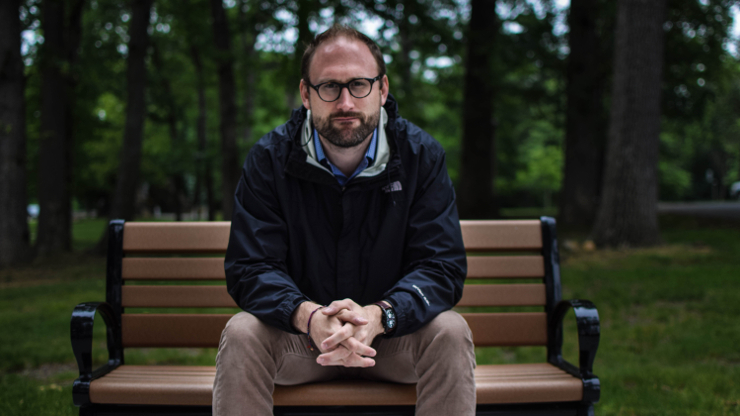Caldwell University
August 22, 2017
Dr. Bennett Publishes Book on “Practices of Love: Spiritual Disciplines for the Life of the World”

Kyle David Bennett, Ph.D. is assistant professor of philosophy at Caldwell University.
His book, “Practices of Love: Spiritual Disciplines for the Life of the World,” has been published by Brazos Press.
Dr. Bennett is also program director of The Spirituality and Leadership Institute, a summer program for high school students.
The Department of Theology/Philosophy will host a talk and book signing with Dr. Bennett from 11 a.m. to 12 noon, Monday, Sept. 25 on the first floor of the Newman Center (in the former bookstore location) on Caldwell’s campus. The public is invited to attend.
Bennett gives Colette Liddy, director of media relations at Caldwell, a preview of his book.
CL- Why did you write Practices of Love: Spiritual Disciplines for the Life of the World?
KB- A number of years ago, I was reading some old monks, like John Cassian, on these disciplines and realized that the Christian’s attitude, goals, and the very manner in which we practice these disciplines was moons away from these monks. We practice them to get in touch with God. These monks discussed spiritual disciplines and practiced them in ways that were intentionally in response to the wellbeing of their neighbor. I must have missed church the day my Protestant pastors discussed this. (This is hardly a Protestant problem, though. I know several Catholic, Orthodox, Lutherans, and Mennonite believers that weren’t brought up to see them this way.) I wrote Practices of Love to retrieve this ancient view of spiritual disciplines and to help believers see it anew—in our context, with our circumstances, in light of our concerns.
CL- What is the aim of your book?
KB- To get us thinking about how our relationship with God bears on our relationship with our neighbor. To show the inseparable link between spirituality and society. To narrow the gap between our private lives and our public ones. We were created to be a certain person and live a certain way. And God is instructing, forming, and liberating us to be that person and live that way. And as persons who are able to relate to others, and find ourselves as members of many communities (e.g., home, work, school, city), this inevitably has implications for life in shared spaces with others.
CL- How is Isaiah 58 significant to this book?
KB – When I was writing my dissertation on fasting, I read this passage and was blown away. It could have been the first time I ever read this chapter, I don’t recall. But it was certainly the first time I ever asked myself how well I understood the connection between loving God and loving my neighbor. It’s possible to be wicked while worshipping. To harm others in trying to honor God. This chapter really opened my eyes to God’s desire for spiritual disciplines to be acts of love toward our neighbor.
CL – Explain what you mean by vertical and horizontal in your work?
KB- By “vertical” I mean our relationship with God. By “horizontal” I mean our relationships with other creatures and living things (e.g., human beings, raccoons, flowers, etc.)
CL- You ask your readers to reflect on everyday activities such as how they think, eat, talk, own, work, and rest?
KB- Yes, because spiritual disciplines aim to reform and renew these activities. We do basic human activities everyday. We do them the way everyone else does them. The way we were brought up to do them. But oftentimes we do them selfishly. We think ill of others. We horde our food. We interrupt. We intrude. We buy more than we need. We try to outshine others. We isolate ourselves. In the book I propose that we see how spiritual disciplines get us doing these activities correctly—the way God intended us to do them. In ways that are healthy for us and lead us into deeper harmony with others.
CL- What do you hope readers living a fast-paced, stressed out life walk away with after reading this?
KB – I hope it inspires them to practice these disciplines in a way that works within their schedule and routine. Or for those already practicing them, I hope it edifies them as they try to rework their lives. Or for those who have never even heard of spiritual disciplines, I hope it prompts them to pursue a more examined, integrated, and healthy lifestyle. There are things that we can and must do to bring liberation, renewal, tranquility, and comfort to our lives and those around us. And we don’t have to go far in looking for them. It’s the itty-bitty stuff that we do everyday that makes or breaks the world. Above all, I hope Practices of Love makes this clear.
Read a review of Dr. Bennett’s book in Christianity Today.
http://www.christianitytoday.com/ct/2017/september/are-we-missing-point-of-spiritual-disciplines.html





